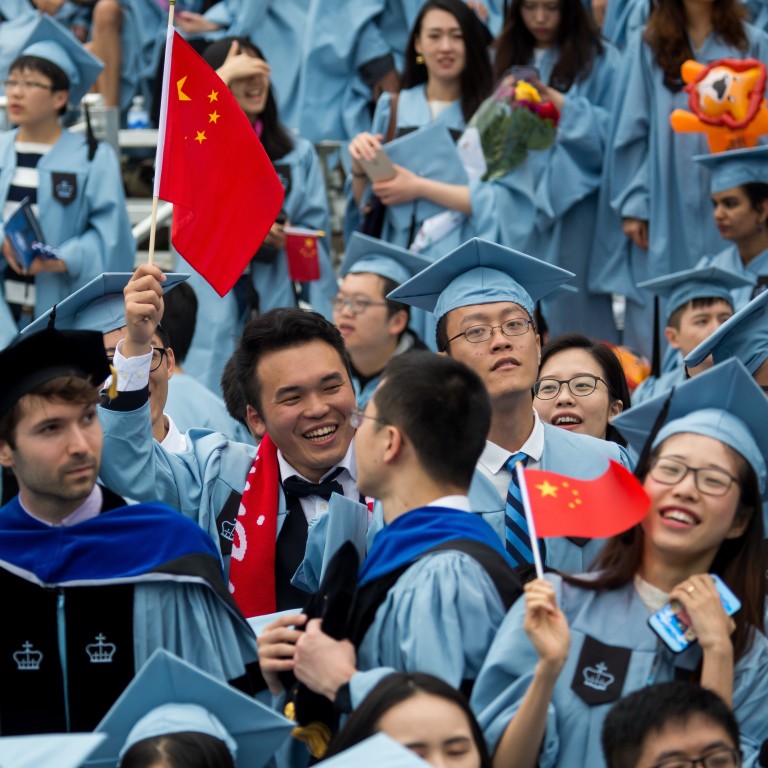
Chinese students prepare to sue after Trump law blocks path to US universities
- Presidential proclamation bans entry to the US by graduates and researchers with links to China’s ‘military-civil fusion strategy’
- Students from eight Chinese universities raise US$300,000 to fund legal action and prepare for a long and expensive court case
The students are from eight Chinese universities – the so-called Seven Sons of National Defence as well as Beijing University of Posts and Telecommunications – that were targeted over their links to the Chinese military.
The Seven Sons of National Defence institutions – Northwestern Polytechnical University, Harbin Engineering University, Harbin Institute of Technology, Beihang University, Beijing Institute of Technology, Nanjing University of Science and Technology and Nanjing University of Aeronautics and Astronautics – acquired their name because of their history of close collaboration with the People’s Liberation Army.
A student surnamed Li, a member of the student group behind the legal challenge, said students were preparing with a lawyer to appeal on the basis that the proclamation was unreasonably implemented and that it did not safeguard national security.
Li graduated with a bachelor’s degree from Harbin Institute of Technology in 2020 and has deferred his plans for doctoral studies at UC Davis because of the proclamation.
A questionnaire for those willing to join the lawsuit was distributed through WeChat on June 1 and quickly received more than 1,000 replies. Funds raised for the suit on an online platform exceed US$300,000.
But it falls far short of the amount needed for what is expected to be a long and expensive lawsuit. The students expect the legal action to cost between US$500,000 and US$1 million.
China taps 12 universities to rival MIT and Stanford in science and tech
Li said the students behind the lawsuit had shifted their fundraising target to overseas alumni of the eight blacklisted Chinese universities.
The lawsuit comes after failed attempts to revoke the proclamation, including signing a letter to US universities in May and advocating on social media. Hashtags were created, including #StudentsNotThieves on Twitter and #10043Proclamation# on Weibo.
The letter, co-signed by 550 Chinese students, was sent to 50 US universities, including Columbia University, UCLA and New York University, appealing for their support.
“As we are foreign students with no standing in the US, your help is vital to us. Your voice and support matter,” a letter to Purdue University stated. “Specifically, we ask that you: 1. Persuade Purdue University to join our legal process against PP10043. 2. Speak for us to potential allies as well as responsible authorities. 3. Help reduce the damage to students affected by 10043.”
The students urged the institutions to continue providing online options for the coming autumn semester, and to allow deferred entry until PP10043 was repealed or modified.
According to a PhD candidate studying aviation remotely through Purdue University, who would only be identified by the surname Yang, more than half the universities formally responded to their request and most responded positively.
“The global department of Cornell University replied to us that the university already wrote a letter to US Secretary of State Antony Blinken expressing its concern towards visa rejections. The department also said they would get in touch with the Congress,” the student said.
The university also contacted other research institutions, including Ivy League colleges, to come up with possible solutions, Yang said.
However, none of the universities agreed to join students’ legal efforts as a plaintiff, according to Yang.
The students are planning to send a second letter by Monday.
“The lawsuit could last between six months and years, the lawyer told us,” Li said. “He thinks there is a possibility of winning the case, but he is not sure how the court will rule as there are political factors involved. The court has a responsibility to defend US national security.”
US professor accused of hiding ties to China university stands trial
Wang Chang, a lawyer at Kingsfield Law specialising in immigration law, was quoted by Caijing magazine as saying the lawsuit would be difficult to win.
“US officials have revealed that PP10043 only affects 3,000-5,000 Chinese students each year. The number means it is of very low priority and is basically out of consideration. Biden has many high-priority issues to be dealt with,” he said.
“From a procedural point of view, the Trump administration made more than 1,000 policy changes to the US immigration system in the past four years. It is not easy to correct such negative changes.”
A spokesman for the US embassy in Beijing said the proclamation affected less than 2 per cent of the overall number of students and exchange visitor visa applicants from China.
The spokesman said the US would promote international research collaboration and ensure the US maintained scientific pre-eminence, however he said China sought to exploit vulnerabilities caused by the openness of the US academic environment.
A student who graduated from one of the targeted institutions with a master’s degree in architecture, and was headed to the US for doctoral study, said she was disappointed by the response of their home institutions.
“The schools offered no help to us,” said the woman, who did not want to be named. “They didn’t even mention a word about the policy.
“We are no different from other science and engineering universities in China. Undergraduates as well as most graduate students in our schools aren’t involved in confidential projects, yet we fall victim to the label of the ‘Seven Sons of National Defence’.”
Chinese student with 10 college offers denied US visa due to policeman father
She noted that although it was a tough fight to revoke PP10043, the students would not give up.
“We refuse to be stigmatised,” she said. “We want to make our own voice heard.
“Although the group of affected students is relatively small, the impact [of PP10043] is tremendous when landing on each individual.”

